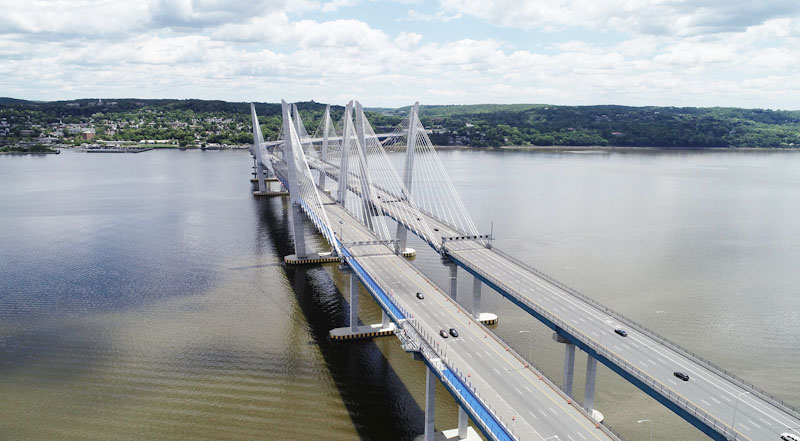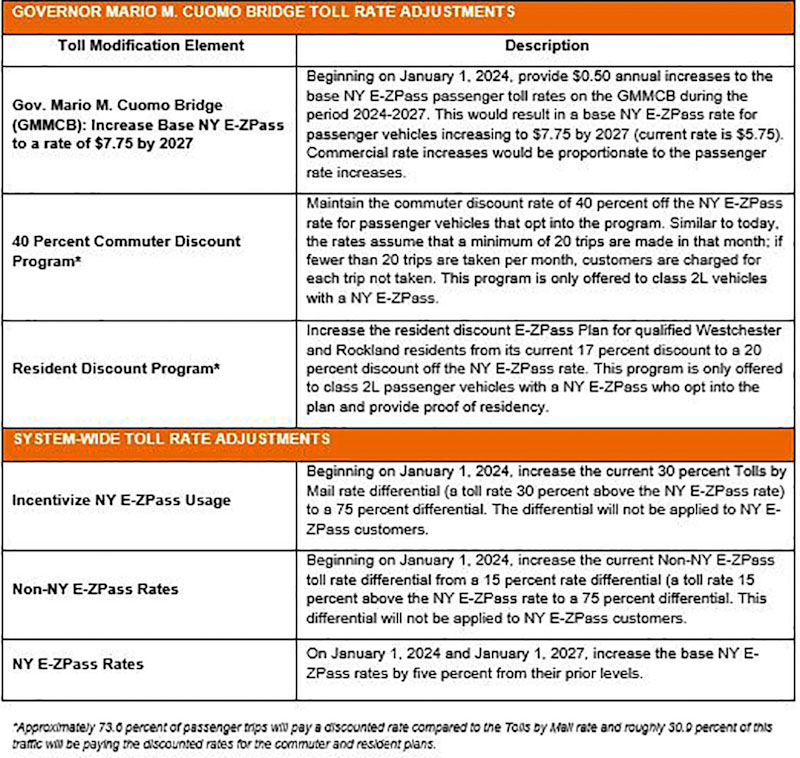Revenue to Support $470M in Capital Projects
Thruway Board Approves Toll Hikes for 2024
ALBANY—The New York State Thruway Authority Board of Directors approved on Sept. 18 toll increases on the New York State Thruway system following a 10-month long public process. The new rates take effect on Jan. 1, 2024.
The action involves the first NY E-ZPass System-wide toll adjustment in 14 years. Thruway tolls statewide remain frozen system-wide through 2023.
The action involves the first NY E-ZPass System-wide toll adjustment in 14 years. Thruway tolls statewide remain frozen system-wide through 2023.
Beginning on Jan. 1, 2024, the base NY E-ZPass rate will increase by 5% outside of the Gov. Mario M. Cuomo Bridge, representing the first toll adjustment for these customers since 2010. A second 5% increase will take effect in January 2027. Standard toll rates for Non-NY E-ZPass (currently 5.1 cents per mile for passenger cars) and Tolls by Mail rates (currently 5.8 cents per mile for passenger cars) will increase to 8.6 cents per mile for both groups by 2027. These rates will remain below the current standard rates of many other systems across the nation.
Similar adjustments will be made to all rates system-wide (Gov. Mario M. Cuomo Bridge and other fixed rate tolling points) and for the Non-NY E-ZPass and Tolls by Mail commercial rates as well. This change results in toll rates that are comparable with what other cashless tolling facilities charge nationwide, Thruway Authority officials stated. Under the plan, the differential will not be applied to NY E-ZPass customers, making it the most affordable payment option available to all of our motorists who sign up for a tag (thruway.ny.gov/getezpass).
NY E-ZPass customers are the most frequent users of the Thruway and receive the steepest discounts and highest level of convenience for payment. Non-NY E-ZPass and Tolls by Mail customers pay a differential and are much more infrequent users of the system. The differential covers additional processing costs and incentivizes customers to get a NY E-ZPass tag for the easiest and most affordable way to pay their tolls. NY E-ZPass tags are available regardless of residency in New York State.


Increases for the Gov. Mario M. Cuomo Bridge
Beginning on Jan. 1, 2024, the fixed toll rate at the Gov. Mario M. Cuomo Bridge (GMMCB) for NY E-ZPass customers will increase by $0.50 each year through 2027. In 2027, the base NY E-ZPass rate for passenger vehicles will be $7.75. Commercial toll rate increases will be proportionate to the passenger rate increases, the Thruway Authority stated.
In addition, the plan preserves the 40% commuter discount plan and increases the resident discount from 17% to 20% for qualified Rockland and Westchester residents on the GMMCB. In 2021, more than 30% of all tolls collected on the GMMCB were discounted through commuter and resident plans.
Thruway Authority Acting Executive Director Frank G. Hoare said the Thruway has some of the lowest toll rates in the country. It was noted that the Thruway Authority receives no dedicated federal, state or local tax dollars and relies primarily on toll dollars to maintain and operate the Thruway, characterized as one of the safest and reliable toll roads in the country.
The Thruway Authority, supported by analysis from its independent traffic engineering consultant, determined that there are additional revenues required for the Authority to fulfill its system-wide operating, debt service, and capital needs through the upcoming forecast period.
There are $470 million in capital project needs that are currently not supported by the resources available for the existing 2022-2026 Capital Program. Eighty-five percent of the Thruway’s roadway base dates back to its original construction in the 1950s, highlighting the need for heavy maintenance, reconstruction, and rehabilitation activities to keep the riding surface in a state of good repair.
The average age of the Thruway’s 815 bridges is 55 years old with 75% of those bridges more than 60 years old. While they are continually inspected and maintained for the safety of the traveling public, more than 85 of them have been identified for replacement within the next decade. The need to replace bridges grows exponentially after the 10-year timeline when hundreds of bridges will need to be replaced in the following decade. To highlight the magnitude of the problem, the projected replacement cost for the most immediate 85 bridges needing replacement is roughly $800 million in today’s dollars. Factoring the hundreds of bridges that will require replacement not long thereafter, the costs escalate into the $6 billion – $7 billion range.
The Thruway Authority Board vote marked the end of a public toll adjustment process that began in December 2022. The process included five public hearings in 2023, receipt and consideration of 210 public comments, completion of the Environmental Assessment for the proposed toll modification, as well as the completion of all of the necessary actions required by the Public Authorities Law, the State Administrative Procedure Act and the State Environmental Quality Review Act.
Motorists can view what the adjusted toll rates will be on the 2024 Toll Adjustment Calculator on the Thruway Authority’s website.
